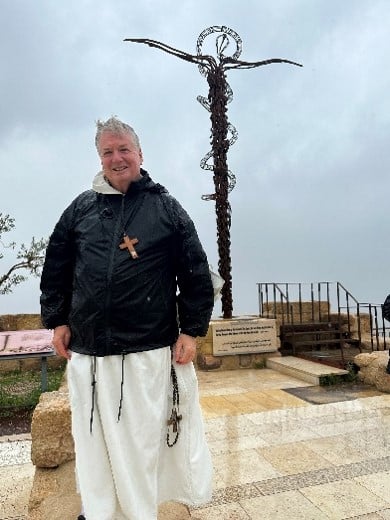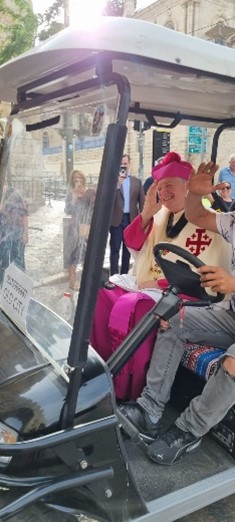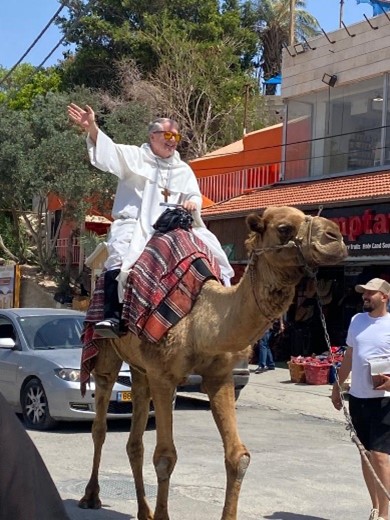Homily for Mass for the Solemnity of Our Lady, Help of Christians, Year A

St Mary’s Cathedral, Sydney, 24 May 2023




You’re probably wondering about my immobility. I can confirm it wasn’t a skateboarding accident—although I do now have a knee scooter and I’ve been engaging in some stellar manoeuvres. Last month I went on pilgrimage to the Holy Land with a group of Sydney Catholic school principals. While on Mt Nebo in Jordan—the place where Moses glimpsed the Promised Land—I slipped and fractured my ankle. It could have been worse: Moses died there without ever entering Israel, whereas I got to continue the pilgrimage in a ‘moon boot’ and have surgery when I got home. It allowed me some interesting forms of transport: the occasional wheelchair, a first century style fishing boat, a golf buggy, and at one stage a camel—as well as plenty of support from those travelling with me…
When our bodies, minds and spirits are healthy, when our results at school or our other activities are going well, when our family relationships and friendships are flourishing, we can feel invincible. Life is on ‘easy mode’. But then a rough patch comes, and our ideal world seems to fall apart. Hopefully at that point we realise that we must depend on others.
The myth that we don’t need anyone’s help can plague even Christians. The Pelagians thought they could achieve perfection by their own willpower; the Quietists thought God would get them out of all scrapes. Both were wrong. Of course, it’s true that God wants to help us, can help us, and does help us; of course, it’s true that we are gifted, free and resolute, and so can achieve a lot on our own; the theological puzzle is how divine grace and human freedom interact. But God didn’t create us as solitary beings in relationship with Him alone. He created us to be alongside others.
Think of the many groups you are part of: your nuclear family, your extended family, your school community, your peer group, your friends, your Church, your ethnic group, your nation, your species, the cosmos of living things. From the moment we come into existence in our mum’s womb, we were in relationships. Part of being human is navigating through life with other people—some of whom we like, some not so much, some of them rivals, others helpers along the way.
In our Gospel today, Jesus does something remarkable. If you’ve ever had a toothache or other serious pain, you’ll know how hard it is to think about anything or anyone else. Yet there is Jesus, hanging tortured on the cross, struggling to pray, speak, breathe, concerned for other people (Jn 19:25-27). Looking down at His Mother, He’s anxious because she’s a widow, with no other children, in a world where such women were very vulnerable; what’s worse, she’s now the mother of an executed criminal. He’s nervous about John because he’s a young fellow, perhaps your age, and will be lost without Jesus in a world hostile to Christians. What does He do? He gives His mum into John’s care and asks Mary to look after John as her own son. But something more profound is happening here: He is giving us all a gift.
When John takes Mary into his home, he is taking her into the Church. With Jesus ‘gone’, she will be there to steady the disciples, encourage them, above all to pray for them. The Acts of the Apostles tell us that in the lead up to Pentecost—this very week—the apostles were “constantly devoting themselves to prayer, along with certain holy women, including Mary, the mother of Jesus” (Acts 1:14). So, through Jesus, we gain access to His heavenly Father, becoming God’s adopted children. But we also get to share His earthly mother, Mary, by becoming children of the Church.
Today we celebrate the gift of her help. Mary’s title ‘Help of Christians’ is uniquely important for us Aussies. Although it’s been used to refer to her since at least the fifth century, it was made an official title for Mary and given its own feast day in 1814 by Pope Pius VII. Pius had been through tough times: he’d been imprisoned for five years by the tyrant Napoleon and unable to carry out his functions as head of the Church. Facing such a bleak situation, he turned to Mary for protection and help, as had his name-saint, Pope St Pius V, two and a half centuries before, when the Church in Europe was similarly threatened. Both asked people to pray the Rosary and join Mary’s prayers to their own; both were convinced that it was Mary’s prayers that led to Europe’s ultimate liberation.
Soon after the proclamation of this title and feast, the first Catholic chaplain to the colony of New South Wales, Fr John Joseph Therry, arrived. He immediately lobbied for a parcel of land so a Catholic chapel could be built in Sydney. He was derisively given a patch of wasteland near the convict barracks and garbage dump—as if to say: you Catholics are all criminals and trash. He was undeterred. Soon the first St Mary’s arose on this site and eventually this great cathedral. He proposed that the chapel-become-cathedral and the new colony be entrusted to Mary Help of Christians: not just so his adopted country and its first church would be first in the world with this new name; not just as a poke in the eye to a protestant establishment disinclined to Marian devotion; but above all because Catholics were suffering persecution as the Church here just as they had under the two popes Pius. Poor, for more than thirty years without priests or sacraments, forced to comply with the worship of the ‘established’ Church, the Catholics were treated as second class citizens. Mary, Fr Therry believed, would look after them, as she had the apostle John.
Some years later, at the First Provincial Synod of Bishops in Sydney, the name ‘Our Lady Help of Christians’ was officially adopted for the patronage of Australia. From the time Fr Therry arrived, the Catholics had been building not only churches like the first St Mary’s on this site, but schools including more than one on this same site. Eventually they would have 1759 Catholic schools in Australia—so far—with nearly 800,000 students and over 100,000 staff, a tenth of them in this Archdiocese. Catholics have gone from being the poorest and most oppressed colonists to being major contributors to every aspect of the life of this country. Mary would be proud of her children!
Catholics instinctively turn to God the Father, Son and Holy Spirit whenever they are in trouble. But they know God didn’t create us as solitary beings in relationship with Him alone: He made us to be alongside others, in the Church on earth and in heaven. And so, repeatedly throughout the Catholic history of our nation, we have turned to Mary and the other saints for prayerful help in tough times, as we did during the recent pandemic. For from the cross Jesus gave us a powerful intercessor with a mother’s hug and she has never let us down. Our Lady Help of Christians: pray for us.
Introduction to Mass for the Solemnity of Our Lady, Help of Christians, Year A – St Mary’s Cathedral, 24 May 2023
Welcome to St Mary’s Cathedral in Sydney for our Mass to celebrate Our Lady Help of Christians, patron saint of Australia, of the Archdiocese of Sydney, and of this Basilica. Due to a problem with my foot, I won’t be able to go up and down the stairs of the sanctuary and pulpit today or around the sanctuary, so I welcome Bishop Umbers as celebrant and I will preside from here.
I acknowledge directors and senior staff from the SCS office; and principals and teachers from our secondary schools. Above all, I extend a very warm welcome to the students from every secondary school in the Archdiocese, both congregational and systemic. For some of you it may be your first visit to St Mary’s Cathedral, the mother church of Australia. Please know that this is your church and so you are always welcome here.
And so, my young friends, on this important day honouring Mary as our helper, welcome to my place and to yours!

